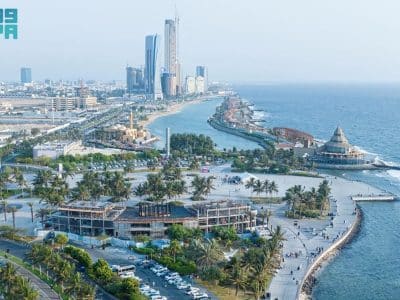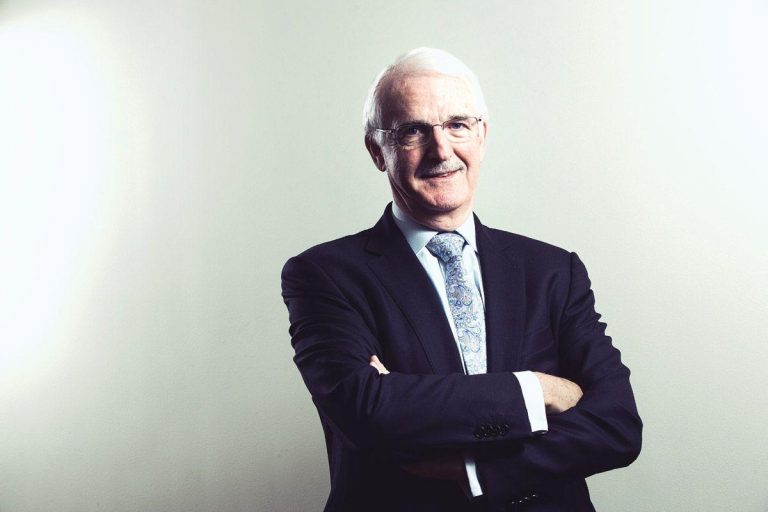When you have worked almost two decades building up one of the best-known luxury brands in the world, you would think that it would be hard to step away just as all the hard work is beginning to come to fruition.
But for Gerald Lawless, it appears to be perfect timing.
He is happy with his lot, has probably done more than what he envisaged, and is now onto the next challenge, working with Dubai Holding as an advisor for their various hospitality and tourism assets.
His departure as CEO of Jumeirah Group in January came after 18 successful years, leading Dubai’s stellar hotel group into a new era.
When the genial Irishman started with Jumeirah in 1997, having spent 23 years with the Trusthouse Forte hotel chain, the business had just two hotels.
On his last day in the job, marked by a farewell dinner at the iconic Burj Al Arab hotel, Lawless left Jumeirah with a portfolio of 23 hotels across 12 worldwide destinations, along with an impressive array of 100 restaurants in the UAE.
His biggest legacy, however, is yet to come.
With more than 20 hotels in the pipeline in the Asia Pacific (including eight in China), Middle East (including Al Naseem in Dubai’s Madinat Jumeirah) and Europe, the group will double in size over the next five to six years. Lawless’ influence on the group’s operations will be felt for some time to come, particularly when its contemporary lifestyle brand Venu begins to develop.
“Jumeirah is very clear in its strategy that the most important thing is that the hotels that it takes on are hotels that are fitting very well with the image and standards of Jumeirah. It’s not about numbers, it’s not just about how many hotels you’re going to have, it’s about the style and type of hotel,” he says.
“And then of course Jumeirah has this new brand called Venu which I think will accelerate a lot of the development of hotels.”
Lawless, however, insists that any discussion about Jumeirah and its future plans, should be undertaken by his successor Stefan Leser, who joined the company from Swiss travel business Kuoni, where he spent the past 10 years, most recently as executive vice president of its outbound travel and inbound specialist businesses, managing a team of 8,000 employees.

Wild Wadi is themed around the tale of Juha, a character from Arabian folklore.
An impressive CV, but with little background in the hotel industry, it appears to signal where the powers that be want the company to grow. As one era comes to an end, another beckons.
Lawless says that to recruit someone who has extensive experience in the travel industry, despite the lack of hotel background, has been quite prudent.
“The fact that Stefan Leser hasn’t worked in hotels is neither here nor there. What’s important is that he understands the industry, which he does very well from his time with Kuoni, and actually that can be very beneficial for the industry and the company,” he says.
“[Leser] gives a perspective very much from the travel trade point of view – where the source of business for all these hotels is, not just in Dubai, but on a worldwide basis. He also has a deep understanding of IT. He has a huge amount to offer.
“Plus, I believe, that within Jumeirah itself, it [already] has very strong operational executives such as the COO Robert Swade and the general managers of the hotels.”
On top of the new advisory role with Dubai Holding, Lawless says he will be tied up over the next two years with the World Travel and Tourism Council, after he takes up the chairman role this month.
“I will be working closely with the president and CEO of WTTC, who is based in headquarters in London, in various duties, attending conferences, meetings and conventions where the WTTC plays a major role. I’ll also work closely with UNWTO [the UN World Tourism Organisation] and WEF [the World Economic Forum] agenda council for travel and tourism, of which I have been a member for three terms,” he says.
The WTTC chairmanship will compliment his Dubai Holding role, he says, given the strong position tourism plays in Dubai’s economy. Dubai will play a central role delivering his message that “travel and tourism is a force for good”.
“It’s a huge contributing factor to the global economy, which is very often misunderstood by governments worldwide with regard to its value,” he says.
Not in Dubai, where travel and tourism play an integral role in its economy, not least because of its ease of access to visitors. Lawless says a decision by the Ruler of Dubai, Sheikh Mohammed bin Rashid Al Maktoum, 15 years ago to introduce visa-on-arrival into the emirate for 30 countries has played an important role in its success story.

Jumeirah Group opened its luxury Port Soller Hotel & Spa in Mallorca, Spain in 2012.
“They [tourists] would just get a stamp on their passport as they arrived, from a number of nations from Europe, as well as America, New Zealand, Australia — countries that wouldn’t be a threat from the immigration point of view. They would be able to access Dubai and the UAE very easily, and look what’s happened with tourism in the 15 years since that was introduced. It’s the old adage of ‘make it easy to buy if you want to sell something’,” Lawless says.
Visa restrictions are hindering countries from developing their tourism, he says. It is an issue that the WTTC has been stressing in its communication with various countries while trying to grow the industry around the world.
“Almost 284 million people are employed directly and indirectly within travel, tourism and hospitality – almost 9 percent of the global workforce,” he says.
Lawless argues governments need a more logical approach to visas, suggesting that a worldwide e-visa programme – supported by a very high level of security – would help boost tourism and related revenues.
“If you look at Schengen [the pan-Europe visa programme] or Esta [the Electronic System for Travel Authorisation programme used by the US] as it is today, you could say ‘why wouldn’t we get a global platform?’ If we do it with electronic ticketing for airlines, why can’t we do it with visas?” he says.
“The point we’re trying to get across is that tourism is a product, it’s an export. If a developing country wants to get European tourists, they know they’re not necessarily going to get reciprocal agreements from Europe for their country, but at the same time why not allow European citizens come to their country, because they need their business.”
Security is high on every country’s agenda right now, particularly in light of the recent Brussel bombings (which took place after this interview).
Lawless insists the WTTC is not purporting for reduced security measures, but argues it could be more efficient to have a common platform shared by governments globally.
“We’re trying to exchange security and at the same time have the benefit of facilitating travel,” he says. “Nobody is suggesting we have less security, in fact we think that our proposition would have more.
“We’re saying that we need an approach that would mean a very efficient, high security level of issuing visas would exist, but it would be on the same platform [across the world]. People could voluntarily subject themselves to this [and] give [their] data. Like the US’s ‘trusted traveller’, where you give all of your data and information and share it with the TSA [Transportation Security Administration], and you don’t have to line up in big queues. It’s all about security and facilitating travel.”

Jumeirah Creekside Hotel has become a landmark on the bank of the emirate’s historic waterway.
Dubai, meanwhile, is moving into a new phase of growth, he says, spurred on by the number of important developments, not least Expo 2020, but also the many theme parks that are now under construction.
“If you look at what’s happening, for example, with different theme parks coming up, I think this is something that’s absolutely needed in Dubai. It will give people a reason not just to visit here but to continue coming back,” Lawless says.
“We’ve seen in Jumeirah with the Wild Wadi waterpark how that’s almost at a million visitors a year, which is about its capacity. It has been highly successful and a big driving factor in getting guests to come back to Jumeirah properties like Jumeirah and Madinat Jumeirah over the years.
“We’ve particularly noticed that children are very influential in getting their parents to go to a destination,” he adds.
The new parks are expected to play a similar role for the emirate – akin to what Orlando’s theme parks do for Florida.
Last year, the number of Indian tourists to Dubai surged 26 percent compared to 2014, which helped offset the impact of a 23 percent drop in travellers from Russia and Eastern Europe in the same period.
“If you look, for example, at one of the theme parks that’s coming up [based on] Bollywood, that’s going to attract a lot more Indian visitors and I believe that’s something we should be looking at very, very seriously ,” Lawless says.
“There’s a huge market out there with one of the biggest countries in the world. It’s going to outpace China this year in terms of GDP growth, and from that perspective we have a lot more to look forward to in terms of developing more business from the Indian subcontinent.”
Lawless says the success of Dubai’s tourism industry is partly due to the way it has developed new markets, spurred on by the growth and reach of Emirates Airline. “It’s always tempting to go with the flow and go to the market that’s giving you all the business at very good rates. But it’s during those times that you also have to make sure that you are really developing new markets and I think Dubai has been particularly successful in that,” he says.
“I remember seven or eight years ago going on a big trade mission to China before it really took off for Dubai. I was there again in Beijing last year and we were told that upwards of 250,000 Chinese visitors came to Dubai in 2014. That continues to grow, because the seeds for that development were sowed seven, eight nine years ago, with good leadership from the point of view of really looking at new potential markets. This is where Emirates Airline comes into it so powerfully and so strongly.”
Lawless says there should be no real concern about Dubai’s recent declines in revenue per available room (RevPAR), which fell 14.7 percent year-on-year to $187.20 in February, on the back of a 9.7 percent drop the previous month.
“That’s a straightforward market dynamic and it’s part of supply and demand,” Lawless says. “People see the great room rates and occupancy levels and come and build a hotel. Dubai is encouraging people to build hotels because of the very high target that we have, with Expo 2020 [but] in the near term, as these new hotels come on, there’s also the possibility that the equilibrium between supply and demand will change. For years, in the hotel business we’ve been enjoying demand exceeding supply, and now it’s much more balanced.”
Lawless says the recent decline should be viewed positively because it has made Dubai hotel rooms more affordable for consumers, adding that hoteliers will have to become more efficient to ensure they get their return on investment.
“I don’t see us going deeply into a hotel or visitor recession here in Dubai. Quite the opposite. I think that it’s evening [out] quite nicely. From what I understand in Jumeirah, we’ve had a very good uptake in future bookings for March and April,” Lawless says.
“You can see a reduction in average room rates, but the occupancy has held quite well. The reduction in RevPAR has been driven more by a reduction in average rate as opposed to a significant reduction in occupancy, which is still in the 80s. A lot of cities around the world would be very happy to get that.”
Digital disruptor Airbnb has not affected business, either, he says. “I don’t think so. I don’t see it being an impactor. A lot of people talk about Airbnb and Uber being disruptors, and this is the way business and life is evolving. It’s just another competitor and I think Dubai has always welcomed competition – virtually every hotel group on earth is represented in Dubai.”
Dubai’s big target is to attract 20 million visitors before Expo 2020 – up from the current 14 million. Expo itself is expected to attract 25 million unique visitors, but Lawless does not expect a dramatic fall post-2020, with the golden jubilee of the founding of the UAE to come in late 2021.
“Hotels will be starting to be built which won’t even be open during Expo because it’s not like the be-all and end-all is 2020. I see Expo as a great target setter, as an objective for people to work towards. There will be a very good future afterwards for hotels,” he says.
“I have no concerns that we’re going to have a massive downturn after 2020. I fully believe that the way Dubai is going, the way it’s developing as an attractive international destination, 2020 will be a massive showcase for Dubai and Dubai will be a showcase for the whole expo industry. Look at the kind of facilities that we’re going to have for huge conventions afterwards, which are a huge part of travel and tourism.”
And front and centre in Dubai’s tourism growth will be Jumeirah.
“I’m absolutely confident that it will continue to thrive. It’s a very prosperous company, it’s a highly regarded brand on an international basis. It will continue to develop its hotel portfolio, both under Jumeirah’s Stay Different [programme] and Venu. It also has a very important restaurant component which has a lot to offer. I’m very excited to see how Jumeirah will continue and confident that Stefan Leser will prove to be a great leader,” Lawless says.
“The Jumeirah occupancy will still be in the 80s. I’m confident that the slowdown we see worldwide – I’m not an economist, but I have been in business a while and I genuinely don’t see it as a deep recession. I see it as a shallow evening off before it comes back again.
“I’m optimistic that before the end of the year we’ll see quite a significant upturn in the economies worldwide.”








